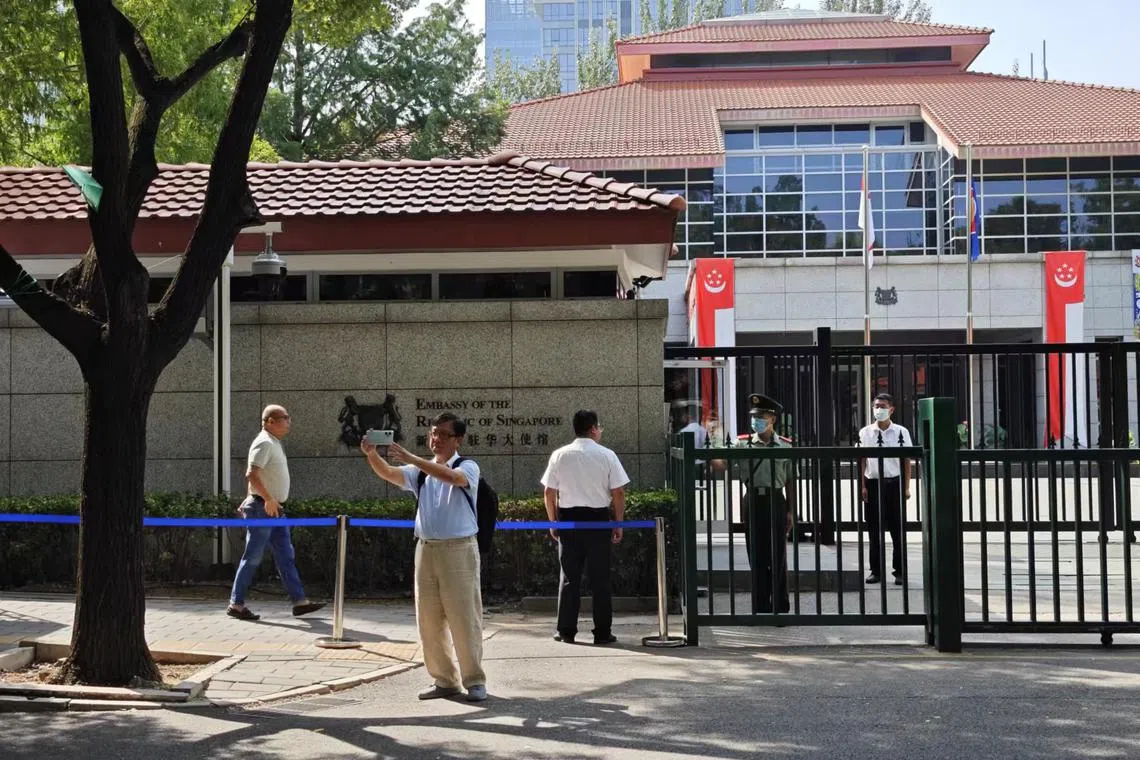Singaporeans overseas vote for next president
Sign up now: Get insights on Asia's fast-moving developments
BEIJING/TOKYO – Singaporeans overseas cast their votes to elect the country’s next president
At the Singapore Embassy in Beijing, voters described the process as quick and smooth. More than 20 people had voted by 10am, including Singapore Ambassador Peter Tan and others who came by after dropping their children off at school.
It was Mr Lee Kheng Joo’s first time voting overseas despite having worked in and out of China for more than 20 years. After voting, he took a selfie outside the embassy in Beijing to show his friends.
The 58-year-old, who works in business advisory, said that for previous elections, other commitments made it difficult to pin down where he would be on Polling Day.
“I am very happy to have voted – for the first time, I knew which city I would be in,” he added.
While the number of overseas voters is small, Mr Lee believes it is still important to be part of the process. “It still matters to us and people in the community. We have a lot of discussions in our overseas chat groups.”
Ms Lin Huiyi, 42, was among the early birds who voted before 9am. The market researcher and artist voted for the third time in Beijing, where she has been based since 2008. She said the process was smooth and organised.
Asked for her thoughts on some of the issues raised during the campaign period, she said the discussion was helpful in clarifying the roles of the president, who has an important role in representing Singapore internationally.
More than 6,600 overseas voters have been registered for the election, including about 3,400 who have decided to vote by post
Mr Jonathan Lee, 21, a student at University of California, Berkeley, was among those who tapped the postal option.
“I am a full-time student juggling classes, and having the liberty to walk to a post box any time made doing my duty a lot easier,” he said in an e-mail interview.
Mr Hafiz Roslan, 39, chief financial officer of global logistics firm FLS Group, said it was more convenient for him to vote in person, which he did at the embassy in Tokyo before heading to work.
“I am just five minutes away, so I might as well just come here,” he said.
There are 10 overseas polling stations, which are in places with a significant number of Singaporeans. They are in Beijing, Canberra, Dubai, Hong Kong, London, New York, San Francisco, Shanghai, Tokyo and Washington.

Mr Lee Kheng Joo (centre) taking a selfie in front of the Singapore Embassy in Beijing after voting on Sept 1, 2023.
ST PHOTO: LIM MIN ZHANG
Three candidates are vying to become Singapore’s ninth president – former GIC chief investment officer Ng Kok Song former senior minister Tharman Shanmugaratnam former NTUC Income chief executive Tan Kin Lian.
Ms Yuan Wenling, who voted in Shanghai, said the line-up is competitive, with all three candidates with experience in finance.
Overseas voting allows those not in Singapore, like her, to feel connected to home, she added. She is in her 40s and co-founder of One Singapore in China, a network of groups in Chinese cities and regions with large communities of Singaporeans.
Overseas voters will account for about 0.25 per cent of the 2.7 million voters registered for this election. There were 5,504 registered overseas voters in the last contested presidential election in 2011. Of this figure, 3,375 eventually cast their ballots in nine cities.
Additional reporting by Walter Sim in Tokyo


